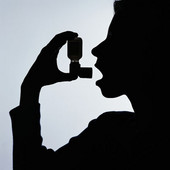 |
 |
 |

Health Hazards in Household Cleaners Exposed
Use of certain cleaning products reduces lung function, increases asthma risk, studies find|
|
HealthDay
Friday, July 25, 2008
 FRIDAY, July 25 (HealthDay News) -- A clean, fresh-smelling home may actually be bad for your health, depending on what type of cleaning and air freshening products you use.
FRIDAY, July 25 (HealthDay News) -- A clean, fresh-smelling home may actually be bad for your health, depending on what type of cleaning and air freshening products you use.
Recent research suggests that exposure to cleaning products or air fresheners that contain a certain volatile organic compound (VOC) called 1,4 dicholorobenzene (1,4 DCB), can reduce lung function by 4 percent. Another study found that the use of spray household cleaners could increase the risk of developing asthma by nearly 50 percent.
Yet a third study, reported by University of Washington researchers this week in the Environmental Impact Assessment Review, found that the fumes from air fresheners and fragrances contain hazardous toxins, none of which are listed on product labels since companies are not required by the federal government to disclose the ingredients in these products.
However, one industry group took issue with the latest findings.
"Research challenging the safety of ingredients in fabric care products is deceptive and raises false fears about products that have a long record of safety and effectiveness," the Soap and Detergent Association (SDA) said in a statement released Friday.
"The research in question is, in essence, a rehash of past studies that offers nothing useful to manufacturers, regulators or consumers," said Richard Sedlak, SDA Senior Vice President, Technical and International Affairs. "The lack of any exposure assessment greatly diminishes the significance of the alarmist warnings made by the author."
One expert agreed that the findings should not send people into a panic.
"I don't think everybody's getting asthma from air fresheners and house cleaners, but this suggests that more research needs to be done," said Dr. Jennifer Appleyard, chief of allergy and immunology at St. John Hospital in Detroit.
Most people with asthma instinctively avoid these types of products, said Dr. David Rosenstreich, director of the division of allergy and immunology at Montefiore Medical Center in New York City. But, he added, the study on VOCs "suggests that other people should probably avoid them, especially considering the way we live in our homes today, tightly wrapped inside, so that if there are any chemicals present, we're constantly breathing them in."
VOCs are found in cleaning products, paints, tobacco smoke and other household chemicals, according to the study, which appeared in a recent issue of Environmental Health Perspectives. Benzene and acetone are two commonly used VOCs. The volatile organic compound known as 1,4 DCB is the chemical that gives mothballs their distinctive odor. It's also found in room deodorizers, insecticides and in urinal blocks.
While it's known that perfumes and chemical products can trigger asthma, researchers at the U.S. National Institute of Environmental Health Sciences reviewed data from nearly 1,000 adults who provided information on VOC exposure for the National Health and Nutrition Examination Survey.
They found an average decrease in lung function of 4 percent was associated with exposure to 1,4 DCB.
The second study was conducted in Europe and included 3,500 people from 10 countries. The study, published recently in the American Journal of Respiratory and Critical Care Medicine, found that regular use of cleaning sprays -- such as air fresheners, furniture cleaners and glass cleaners -- was linked to a 30 percent to 50 percent increased risk of asthma.
"Everybody knows that cigarette smoke and car emissions are the kinds of chemicals that can trigger asthma, but maybe we better look at things that are in our everyday life, like air fresheners," said Appleyard. She also pointed out that, ironically, a chemical marketed to reduce allergens if you sprinkle it on your carpets is a significant irritant to people with asthma.
For both people with asthma and even those without, Appleyard said it's a good idea to avoid harsh chemicals. "Try to go green with your cleaning products. Always reach for unscented laundry detergents and cleaning products," she advised.
If you're using chemicals to clean, she recommended always doing so with proper ventilation. She also recommended keeping the windows open and wearing a mask while cleaning.
Rosenstreich echoed Appleyard's sentiments. "I assume people with asthma and nasal symptoms are probably already avoiding these products, but even for people without these conditions, it would be wise to avoid them. You can't control pollution or pollen, but you can control your exposure to cleaning products, and it's a good idea to control anything you can, because these changes occur slowly over time."
HealthDay
Copyright (c) 2008 ScoutNews, LLC. All rights reserved.
Related News:
More News on this Date
Related MedlinePlus Pages:
| Home | Health Topics | Drugs & Supplements | Encyclopedia | Dictionary | News | Directories | Other Resources | |
| Disclaimers | Copyright | Privacy | Accessibility | Quality Guidelines U.S. National Library of Medicine, 8600 Rockville Pike, Bethesda, MD 20894 National Institutes of Health | Department of Health & Human Services |
Date last updated: 28 July 2008 |




